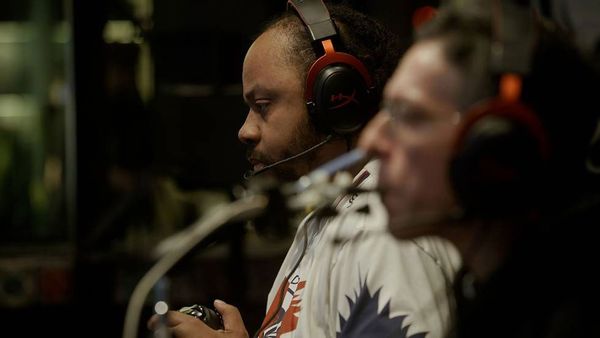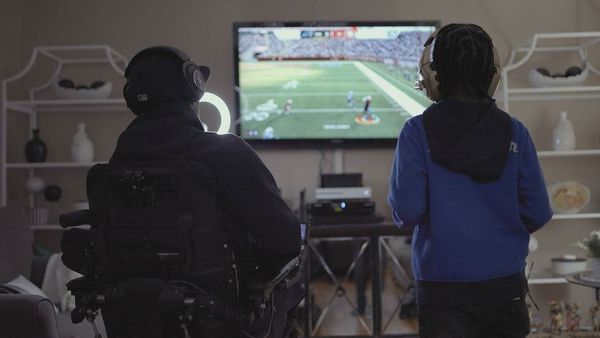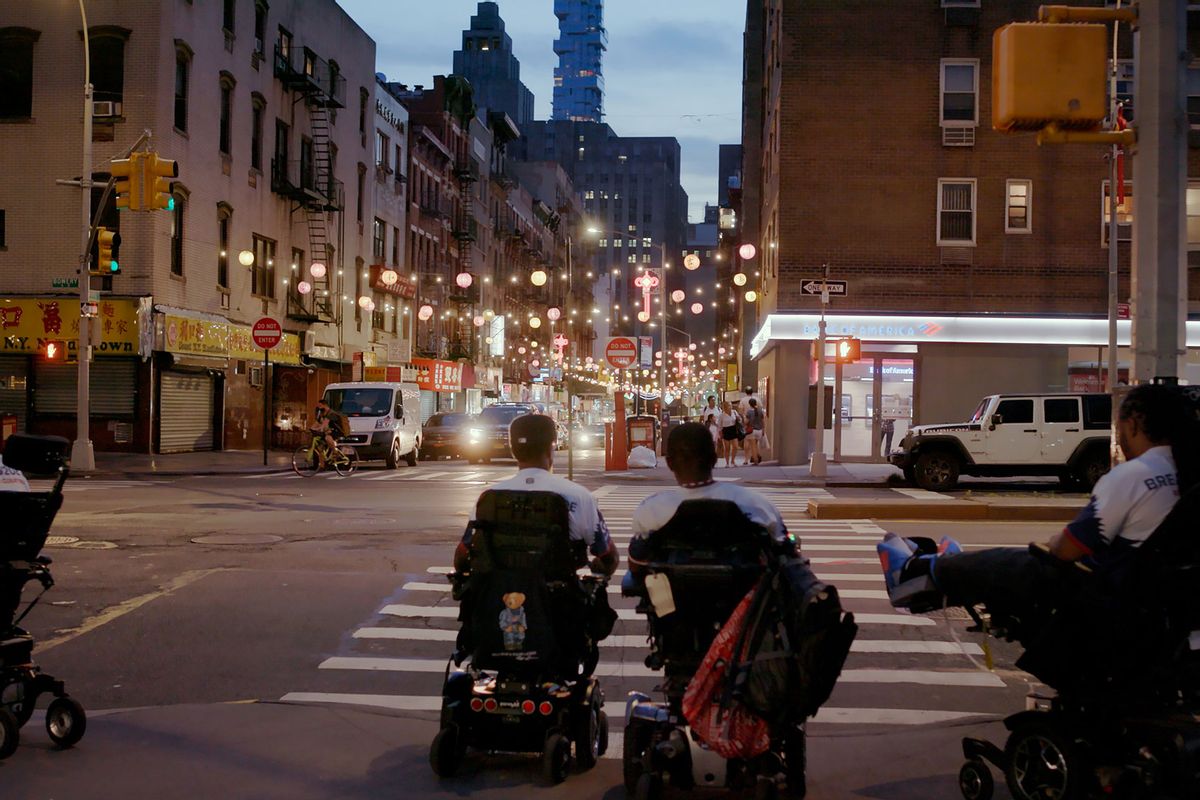The engaging Max documentary “Quad Gods" profiles Richard, Blake and Prentice, three members of the titular esports team. Director Jess Jacklin’s compassionate film shows these disabled gamers and their teammates playing "Rocket League" with adaptive controls (sometimes using breath and head movements), but the central focus is how each of these men see themselves.
"Playing can help with my finger work and range of motion. That was what made me decide to participate in the team."
Richard is the most competitive of the Quad Gods, and his journey to “find himself again” includes an emotional scene of him driving for the first time since his accident in 2015. Blake is more laid back and is comfortable with who he is; he is seen delivering food and going on a date. He also gives advice to a friend who is experiencing social anxiety. In contrast, Prentice is active in a robotics program that is helping him walk.
“Quad Gods” illustrates the strengths and vulnerabilities of these men who with their peers puncture the misconception that disabled people are “fragile.” They are also seen working with Dr. David Putrino in Mount Sinai Hospital, using technology, including a virtual reality program, to help combat nerve pain.
Richard, Blake and Prentice are all seen living independent lives and finding purpose in their gaming. Thankfully, “Quad Gods” is neither “inspiration porn” or a competition film, but rather, a verité documentary that showcases the dignity of its subjects.
Director Jess Jacklin and subject Prentice Cox, spoke with Salon about their impressive new documentary.
Jess, how did you learn about the Quad Gods, and what compelled you to tell their stories?
Jess Jacklin: I met Dr. Putrino, who is the neuroscientist that runs the lab at Mount Sinai about a decade ago. He told me about his lab and what he’s up to. I was dealing with severe chronic pain, and he was telling me he works with VR headsets and was looking to rewire pain receptors in the brain. I went to the lab to check it out. Blake was doing VR as one of Dr. Putrino’s trials. That was my intro to this world. There are all kinds of cool experimental tech in the lab. A couple years after that, I met Chris Scott, the subject in the film who passed away. Chris had been working with Dr. Putrino on getting an esports team together. They had a first meeting, I grabbed a camera and followed what they were doing. I kept coming around when they picked a name and sponsors, and decided what games they would play. There was a really organic quality to it — a good sense of community and camaraderie.
Prentice, what prompted you to participate in the film and trust Jess to tell your story?
Prentice Cox: When I decided to participate, it was about to be wintertime. In the wintertime, I am a bear; I hibernate. I figured I am going to be in the house anyway, so I can play games with you guys. Playing can help with my finger work and range of motion. That was what made me decide to participate in the team. I knew Rich and Blake, so I decided to take part in it. When I met Jess, it was the camaraderie and level of trust and how she spoke to me. The second time Jess was there, she became part of the family. I met her, liked what she had to say, and trusted her from the first day.
 Richard Jacobs (left), Sergio Acevedo (right) in "Quad Gods" (HBO)Jess, the film is about the Quad Gods’ esport gaming, but the film is less about the competition and really about the people. What decisions did you make about the narrative content of your film and the episodes you present? We see them going to a convention or the movies or delivering food as well as gaming.
Richard Jacobs (left), Sergio Acevedo (right) in "Quad Gods" (HBO)Jess, the film is about the Quad Gods’ esport gaming, but the film is less about the competition and really about the people. What decisions did you make about the narrative content of your film and the episodes you present? We see them going to a convention or the movies or delivering food as well as gaming.
Jacklin: There could be a version of this that is a traditional competition film. I knew that wasn’t what I wanted to make. I hung out with these guys, and I knew I didn’t want to make a sports competitional film or making it inherently “inspirational porn.” I wanted to subvert expectations with disabled experience and show them as individuals. I wanted to look at how tech was playing a role in their lives. The exercise of designing avatars was born in this concept: What would your avatar be? Some wanted Iron Man or Street Fighter characters; others wanted to see themselves in the video game and wanted to see their chair in the game. I loved that it was a device to talk about their individual experience. That to me was when I decided to focus and what I felt was true to what their story was. I wanted to ground it in a verité lens of what was everyday life like, find the intimate moments, and spend time getting to know them.
Prentice, why is Rocket League the game you play? Can you describe what does playing do for you? Not just how it is therapeutic, but what it gives you.
"I knew I didn’t want to make a sports competitional film or making it inherently 'inspirational porn.'"
Cox: Rich got me into playing "Rocket League." I play "John Madden" and sports games. "Rocket League" is a sport, though not a professional one. I do game, and "Rocket League" is fun and competitive, but I am not too competitive. It depends on my mood. If I lose, I might be hard on myself — especially if I’m playing with Rich. I just take it easy. It’s a game to me. I do want to win; I’m not playing to lose. It’s a fun game, and while I’m not the best, I’m getting better at it. Sometimes I can impress myself and my teammates. Rich will ask, “Where did you get that [move] from?” I don’t know, but I’ll act like I do! [Laughs]
Without knowing it, ending up in a wheelchair made me realize football was a release for me at the end of the week. During the off-season with training, and it was an exit for all my frustrations and all my built-up pressures. I had to find something else to do. This [gaming] is helping me channel my competitive spirit again. It allows me to have fun at the same time. Especially, playing "Madden," where I can do the things I used to do on the field. It helps me forget about the stresses I have.
Can you both talk about the camaraderie of the Quad Gods. I like the support, the occasional argument, but also the sense of community. The film captures the spirit and sense of belonging and a sense of purpose.
Jacklin: What I watched happen was really beautiful, especially that scene where they bring Andy [a newbie] in. Andy just took second place in a big tournament ,and all the Quad Gods were there watching him competing for first place. It continues. It’s a live, active effort to keep getting more people these adaptive controllers and get people involved. It’s a mission for these guys.
Cox: Video games are so universal. Rich doesn’t play football, but Blake did play football, so he could relate, but Andy was so young when he got injured, he couldn’t relate. Video games are a common ground we all have. I knew some of these guys before the Quad Gods, and I didn’t know we had that in common. After the documentary was made, I am still meeting newly injured people that like to play video games. I’m part of a peer mentoring group at Mount Sinai, and when we talk about the possibility of playing video games, no matter what their physical limitations are, their face brightens up. That’s a win for me to be able to share that common ground and meet new people.
Jess, you use animation, interviews and observational footage. How did you engage with the subjects and showcase them living their lives, working, playing, and dreaming? You have different visual styles for each activity. How did you approach making the film and telling these stories?
"Inclusion is definitely something we are lacking in this world . . . What can assist the disability community?"
Jacklin: When I thought about this, it was a process for me. I filmed with a lot of members of the team, and you film so much more than what you use. I knew I wanted to look at this spectrum of this disabled experience. That was at the core I wanted to explore. I wanted to bring in animation. I wanted to find an intimate visual language rooted in the everyday experience and create a sense of connection between the subject and the audience. Viewers see these real moments — taking your kid to school, going to work, going on a date, hearing a funny story on a date, going through rehab — to find real moments in a verité sense. That was the heart of what I wanted to do. This layer of animation would allow me to bring it to a more conceptual place. We did quite a few interviews, and it’s a process of mining the emotional experience and bring every characters’ voice into it. We used on-camera interviews for each of the leads when they are sharing some of their more intimate experience. I thought it was good to connect with them on camera in those moments, but for the most part you are really in the scenes and moments with them.
Cox: Which was genius, by the way. Some of us had ideas [points to himself] that didn’t come to fruition, but when she said she could make it in animation, I thought it was genius.
 Prentice Cox (left) playing video game with his daughter in "Quad Gods" (HBO)Prentice, you talk in the film about how, after your injury, you relearned to eat and hold a cup. You also are shown learning to stand and walk. What observations do you have about your progress?
Prentice Cox (left) playing video game with his daughter in "Quad Gods" (HBO)Prentice, you talk in the film about how, after your injury, you relearned to eat and hold a cup. You also are shown learning to stand and walk. What observations do you have about your progress?
Cox: My journey, it is up and down. When I was newly injured, people used to say to me, “You will have good times, bad times, and be up and down.” I’ve been in a chair for 21 years. I don’t stop with the therapy. Sometimes, I’m guilty with slacking off and not doing as much as I should be doing consistently. I was able to walk with just a brace on my right leg and walk around the gym with a walker. When that started happening, I thought things are coming back and I thought what’s next? It was too fast; I jumped the gun, and I lost the ability to do some things I had been doing. But thank God, the exoskeleton came about and that is the second beginning to getting back on my feet. The pressure of the film coming out now and people checking on my progression, that’s the pressure I might need.
Motivation, Prentice, not pressure! The film uses gaming and virtual reality to control legs which helps stimulate nerves and reduce pain. There are other concerns about bone loss. The film shows how technology and treatments are helping quadriplegic patients. Can you talk about these advances?
Jacklin: Blake has had great results from VR moving his legs. He deals with a ton of pain and goes regularly for sessions to manage his pain. It’s so incredible what Dr. Putrino is doing. He is finding ways to bring technology that we are familiar with and using it in ways that are unexpected. He is always looking and experimenting with different gadgets, controllers and ways of monitoring things. He is looking to bring tech in rehabilitation stetting, and there is so much potential with things that already exist and things that we keep designing. There is a growing awareness around how we design things, but there is a long way to go. There is still a lot we can do to continue to be inclusive. There is a lot of this “Black Mirror,” AI is going to take over. It is not that we shouldn’t be concerned, but I like to take an optimistic lens on the future.
Want a daily wrap-up of all the news and commentary Salon has to offer? Subscribe to our morning newsletter, Crash Course.
Blake says that he found the “real me” after his injury. There is a moving scene of Richard driving for the first time since his injury. Prentice, what are your thoughts having made this film about how it can inform folks about disability and representation?
Cox: That is why I am so appreciative for Jess doing this and bringing it to life. Inclusion is definitely something we are lacking in this world. Inclusion for anything outside of what may be the normal. It’s very important. You might not consider things that affect the disability community, such as when planning an event — is it wheelchair accessible? Something as simple as that, or as extreme as General Motors normalizing vehicles to come with ramps and hand controls. I don’t fault people for not having it in the front of mind, but at least get it closer to the front of your mind. What can assist the disability community?
“Quad Gods” debuts July 10 at 9:00 pm on HBO and will be available to stream on Max.
Read more
about this topic



Shares